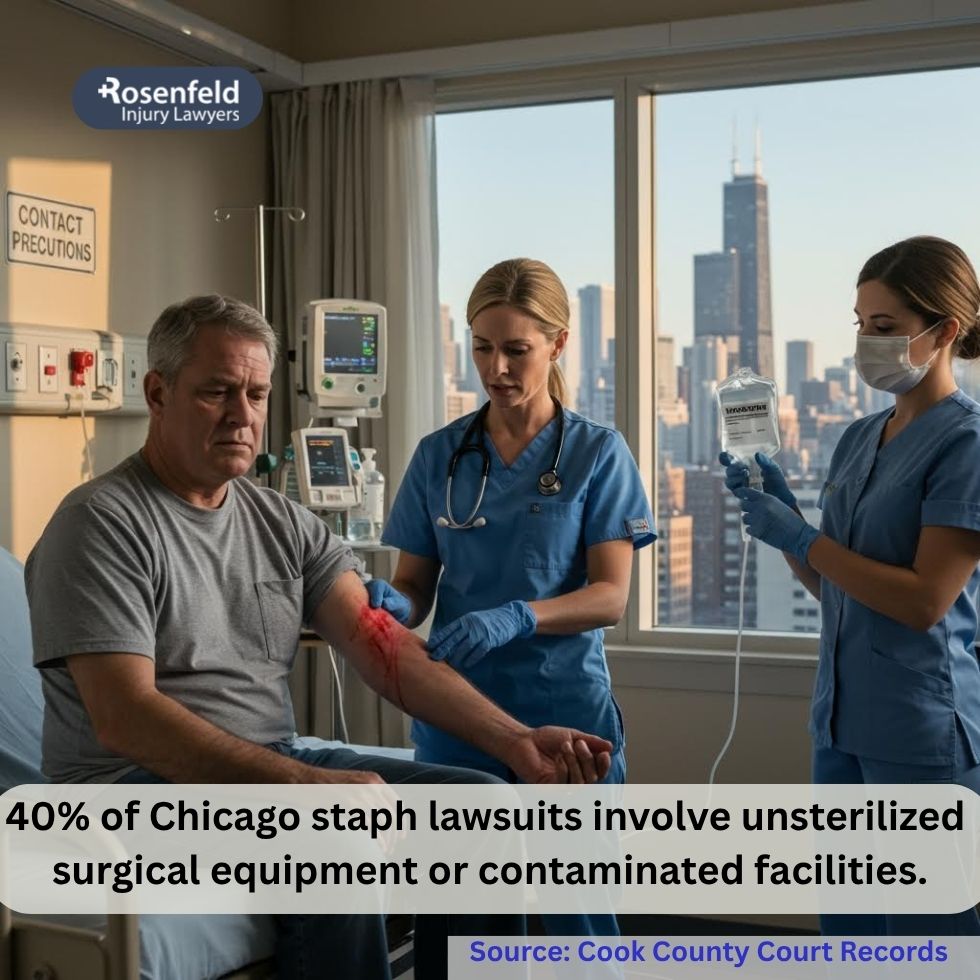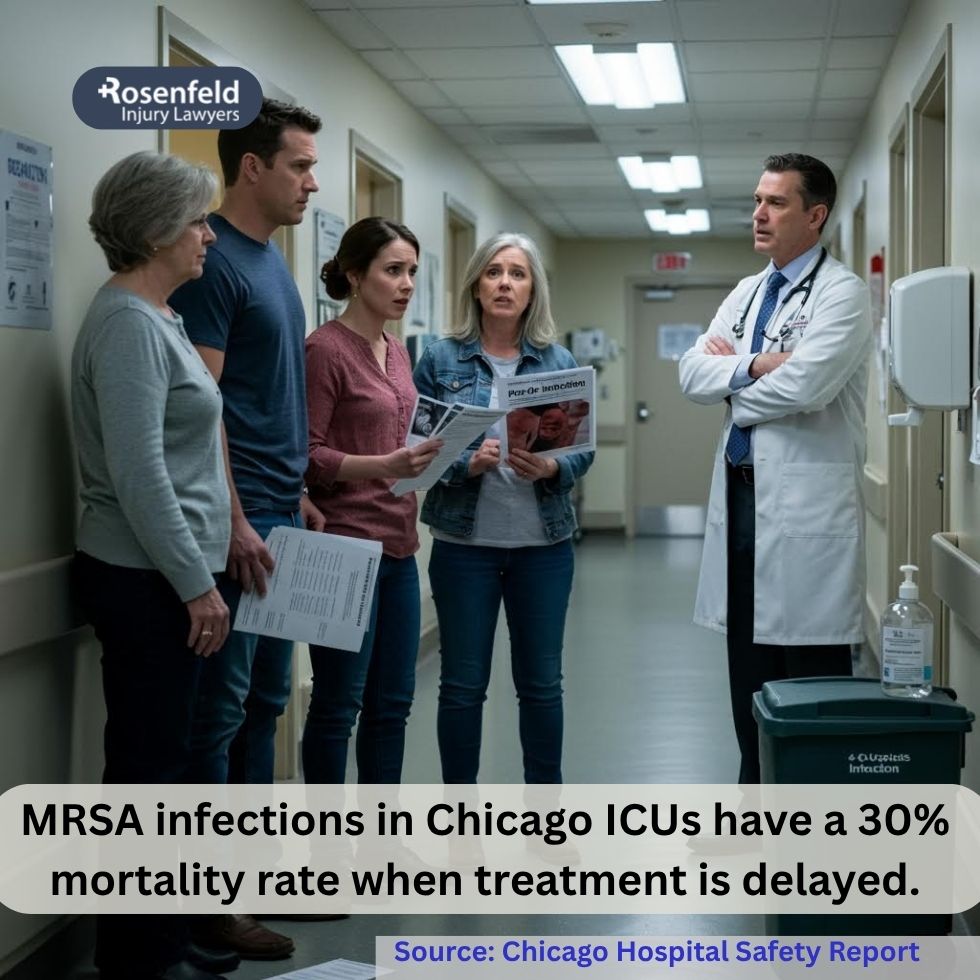- 24/7 Free Consultation: (888) 424-5757 Tap Here To Call Us
Chicago Staph Infection Lawsuit
Work With Experienced Attorneys to Get Justice for Serious Staph Infections
Staph infections are one of the most common hospital-acquired infections, and they can have devastating consequences. Healthcare providers can be held liable for negligent disease control through a staph infection lawsuit. Contact us today for a free case review.
Our Medical Malpractice Lawsuit Verdicts
- $1,899,000 wrongful death suit for hospital infection
- $2,150,000 nursing home abuse settlement for a patient who developed sepsis
- $3,245,000 long-term hospital negligence for a patient who acquired bed sores
What are Staph Infections?
Staphylococcus bacteria cause staph infections. There are at least 30 different types of staph bacteria, but most staph infections are caused by Staphylococcus aureus.
Most people have staph bacteria on their skin, which don’t cause problems in healthy patients. When the bacteria penetrate the skin surface, though, it can lead to serious symptoms and post-surgical complications.

Types of Staph Infections
To treat the hospital staph infection, doctors and nurses must understand the specific organism causing the infection. This ensures they can take the necessary precautions to prevent the spread of disease while providing effective treatment.
Skin Infections (Boils, Cellulitis, Impetigo)
As people usually have staph on their skin, which is asymptomatic. However, those with weakened immune systems, nutritional deficiencies, or poor hygiene may develop skin infections, including boils and cellulitis.
Methicillin-Resistant Staphylococcus Aureus (MRSA)
MRSA infections are often more serious than other staph infections because they are resistant to most antibiotics. MRSA can cause severe symptoms, including deep skin wounds and damage to internal organs.
Sepsis and Toxic Shock Syndrome
If a staph infection is not treated promptly, it may lead to high fevers, elevated blood pressure, and organ failure.
Osteomyelitis (Bone Infection)
Once the staph infection has entered the bloodstream, it can spread to the bones and cause severe inflammation. Not only does this cause pain, but osteomyelitis can also spread to nearby joints, resulting in septic arthritis and making every movement painful.
Pneumonia
Staph infections are a common cause of pneumonia in hospital patients. These patients have a high risk of dying from the infection, or they may be left with long-term issues like lung scarring.
How Staph Infections are Spread
Staph infections can easily spread from person to person, especially since the bacteria are commonly found on the skin of most people. Transmission usually occurs after someone touches a contaminated surface and then touches an open wound or cut. Even a small cut could result in an infection.
In some cases, such as when someone has pneumonia, airborne droplets can spread the disease to others who have not taken appropriate precautions.
Risk Factors for Developing Staph Infections
Certain people are more prone to staph infections than others. Common risk factors include:
- Extended hospital stays
- Weakened immune system
- Underlying health conditions like diabetes
- Open wounds, especially over a large surface area
- Close contact with infected individuals
- Invasive medical devices, such as catheters
- Living in crowded conditions
Common Locations Where Staph Infections Are Acquired
Common settings with a higher risk of staph infections include:
- Hospital settings, including long-term care
- Nursing homes and assisted living facilities
- Communal living, such as barracks or dorms
- Gyms and athletic facilities
- Schools and daycares

Negligence and Liability for Staph Infections
If you can prove that another person or organization caused your infection, our Chicago personal injury attorneys can help you pursue a staph infection case. The legal basis for these lawsuits is negligence, which means that someone failed to act as a reasonable person would in the same circumstances.
Medical Malpractice: Negligence in Healthcare Settings
A medical facility is required to provide safe and sanitary conditions for every patient, including measures to prevent the transmission of communicable diseases. If medical staff fail to uphold the following duties, they may be subject to a medical malpractice claim.
- Failure to Maintain a Sterile Environment: Under Chicago ordinances, hospitals and other healthcare facilities are required to have an infectious waste management program (§7-28-516). If they fail to do so and cause hospital-acquired infections, a medical malpractice lawyer can hold them accountable.
- Inadequate Handwashing: Because staph can spread from direct contact, healthcare workers must be diligent about washing their hands before touching patients. Failing to do so is considered negligent behavior.
- Improper Wound Care: Any injuries must be thoroughly cleaned and rebandaged on a regular basis. Failing to check and clean wounds is medical malpractice.
- Failure to Diagnose: Staph infections may sometimes have similar symptoms to other issues, which is why doctors need to perform tests.
- Failure to Treat: Staphylococcus infections typically require intravenous antibiotics and other interventions. When these are not provided, the patient may suffer serious complications or even die.
Premises Liability: Unsafe Conditions in Other Locations
Illinois law clarifies that property owners have a responsibility to prevent harm to invited guests (740 ILCS §130/2). Inadequate cleaning practices or failing to warn guests of potential diseases can result in a premises liability lawsuit. Gyms, schools, hotels, and dorms could all be liable.
Product Liability: Contaminated Products
Workers who fail to wash their hands or wear gloves may easily contaminate products, particularly food. Food that is not cooked before eating is especially prone to contamination, such as sliced meats, sandwiches, pastries, and puddings. Manufacturers, distributors, and food service workers may be considered negligent in a product liability case if you become ill after consuming their products.
Proving Medical Malpractice for a Staph Infection
For medical malpractice claims, our law firm must demonstrate that the liable party was negligent. This includes four factors:
- Duty of Care: The liable party had a responsibility to act reasonably, thereby preventing harm to others. In a medical malpractice suit, this would involve things like infection control.
- Breach of Duty: The person did not uphold this duty of care, such as by failing to wash their hands or not checking invasive medical devices for signs of MRSA.
- Causation: This breach of duty directly caused your illness.
- Damages: You suffered financial or emotional losses. The purpose of the suit is to recover damages for these losses.
Steps to Take After Contracting a Staph Infection
You must act quickly if you have a staph infection, both to preserve your health and ensure you have a viable legal case. Follow these steps as soon as possible.
- Seek Immediate Medical Care: Visit a highly respected hospital, such as UChicago Medicine or Rush University Medical Center, for treatment.
- Document Your Expenses: Keep a record of your medical bills and other expenses to support your claim for damages.
- Report the Infection: The MRSA Screening and Reporting Act requires hospitals to inform the Illinois Department of Public Health about staph outbreaks (210 ILCS §83/1). You should also tell them who you might have been in contact with who may have caught the disease.
- Identify the Source: Using your medical history and records, work to determine where you may have caught the infection and who else may have been exposed.
- Preserve Evidence: Keep your medical records and bills. Take photos of any injuries and document your recovery.
Filing a Lawsuit for a Staph Infection in Illinois
Our team will guide you through every step of the lawsuit process, which includes the following.
- Investigation and Evidence: With your informed consent, we will review information about your case, including medical records related to any hospital stay.
- Filing a Complaint: Our team will file a complaint with the local court and write a demand letter for the applicable insurance agency.
- Discovery: We will share important documents with the other parties involved.
- Negotiation: Using our negotiation skills, we will work to secure a fair settlement.
- Trial: In some cases, we’re not able to settle out of court. We will represent you at trial and share your story with the jury.

Compensation a Medical Malpractice Attorney Can Help You Recover
LeBron v. Gottlieb Memorial Hospital established that there is no cap on personal injury damages, which can include:
- Hospital bills
- Lost wages
- Loss of earning potential
- Future medical expenses
- Burial and funeral expenses for wrongful death
- Pain and suffering
- Loss of enjoyment of life
- Loss of companionship
Statute of Limitations for a Medical Malpractice Lawsuit in Illinois
For a malpractice or personal injury lawsuit, you have two years to file (735 ILCS §5/13-212). To ensure we have sufficient time to investigate, please contact us promptly for a complimentary legal consultation.
Why You Need an Experienced Chicago Staph Infection Lawyer
Explain what the role of an attorney is (Helping with investigation, maximizing compensation, negotiating with insurance, etc.)
Our team will assist you with every aspect of your case, protecting your legal rights and maximizing your chance of compensation. Through thorough investigation and fierce negotiation, we can secure a fair settlement that covers your future medical care.
Consult a Medical Negligence Lawyer Near You!

Our team works on a contingency fee basis, meaning that you owe us nothing unless we earn you compensation. Call us at (888) 424-5757 or use our online contact form to schedule a free case review.
⭐⭐⭐⭐⭐
How you doing I don’t do this very often I have to recommend Jonathan as a lawyer that I can trust he did his job and I was very satisfied thank you very much Jonathan I recommend you
Read More Google Reviews
All content undergoes thorough legal review by experienced attorneys, including Jonathan Rosenfeld. With 25 years of experience in personal injury law and over 100 years of combined legal expertise within our team, we ensure that every article is legally accurate, compliant, and reflects current legal standards.







